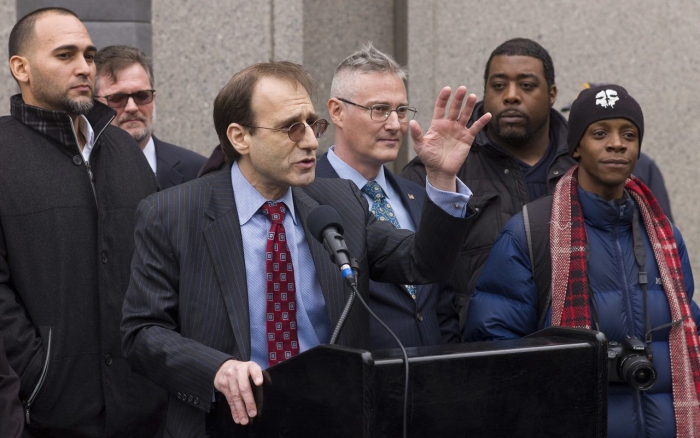Jose Belen was just 20 years old when he and a team of U.S. Army combat soldiers accidentally shot a 7-year-old Iraqi girl in the head during a firefight at the start of the Iraq War.
Fifteen years later, the veteran still struggles to shake that image from his head.
“I watched her die in front of me, closing her eyes and all of that,” Belen told The Post. “I can’t even see my daughter lay down because it reminds me.”
Belen, a native New Yorker, has been struggling with PTSD ever since and for over ten years of his life, he contemplated suicide on a nearly daily basis. He said despite all the pills he was told to take from the VA hospital, marijuana that was given to him by a friend was the drug that saved him.
On Wednesday, he came from Florida to Manhattan federal court, where he and five other plaintiffs have filed a lawsuit against Attorney General Jeff Sessions and the Drug Enforcement Agency to make it easier for veterans to obtain medical cannabis.
“As we speak this morning, there’s a veteran somewhere in America that’s committed suicide. We lose a veteran every 90 minutes or so somewhere in this country… Jeff Sessions, look into your heart,” Belen said in front of the courthouse to a crowd of supporters shortly before a hearing on the case.
“Wherever you are, look at us. We’re not misfits, we’re not stoners. We’re citizens of this country. This is the very fabric of America, we will not be held down anymore.”
Currently, marijuana is considered a schedule one controlled substance on the federal level — a classification from 1970 under then-President Nixon as one of his first fronts for his war on drugs. Despite medical marijuana programs in 30 states and recreational programs in eight-plus the District of Columbia, schedule one drugs are classified for their lack of medical benefit and high potential for abuse. Among marijuana, other schedule one drugs are heroin, LSD and peyote.
The other plaintiffs in the case include former New York Jets star Marvin Washington who used medical cannabis to end his dependence to opioids and two children, Alexis Bortell, 12, and Jagger Cotte, 7, whose parents say wouldn’t be alive if it wasn’t for the drug.
Michael Hiller, the plaintiff’s attorney, argued against a motion to dismiss the lawsuit Wednesday while attorneys for Sessions and the DEA tried to argue there’s not enough evidence to show the benefit of medical cannabis. Judge Alvin Hellerstein told the defendants to stop using that argument because it wasn’t valid.
“How can you say that …’There is no currently accepted medical use in the United States?’” Hellerstein asked.
“Some states have said there is accepted medical use… your argument doesn’t hold,” Hellerstein said to the packed courtroom, which was so crowded with supporters overflow rooms were needed.
He acknowledged to Hiller the extreme medical benefit cannabis has provided to his clients.
“How could anyone say your clients’ lives have not been saved by marijuana? How could anyone say their pain and suffering hasn’t been alleviated by marijuana?” Hellerstein said as spectators in the overflow room cheered.
Hellerstein zeroed in on the three required findings that are necessary to consider a drug a schedule 1 substance. He said all three must be met to have the classification. First, it must have a high potential for abuse, second, it must have no currently accepted medical use for treatment in the U.S., and three, the drug is so dangerous, it can’t be used under medical supervision.
“You win on two,” Hellerstein said after noting there is documented and permitted medical use of marijuana in 30 states.
“I’ll take this under advisement.”
While the suit’s success is still uncertain, Belen felt vindicated when he was walking out of court.
“The sheer fact that we were given the attention we received, it was a win. We are now one step closer to hope and victory,” Belen said.
His wife, Danielle, 35, recounted how medical marijuana saved not just her husband, but her entire family.
“When we would go to my son’s football games and we’d try to have this family together time of fun and happiness and smiling, he would just be angry for no reason,” Danielle recalled.
She said her children used to wonder “What’s wrong with daddy? Why is he so mad all the time?”
“Now that he’s using cannabis, those triggers, those thoughts, those intrusive things that go on with him that you don’t see on the outside stopped and he’s able to actually have fun and enjoy life.”
Belen hugged his wife and beamed.
“I found my smile again and it helped me be the husband I was always meant to be.”
credit:nypost.com





